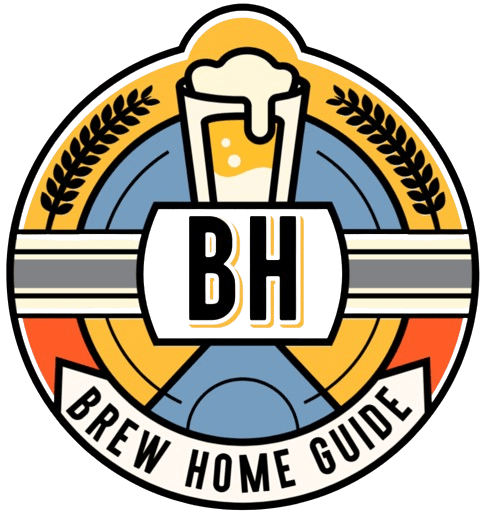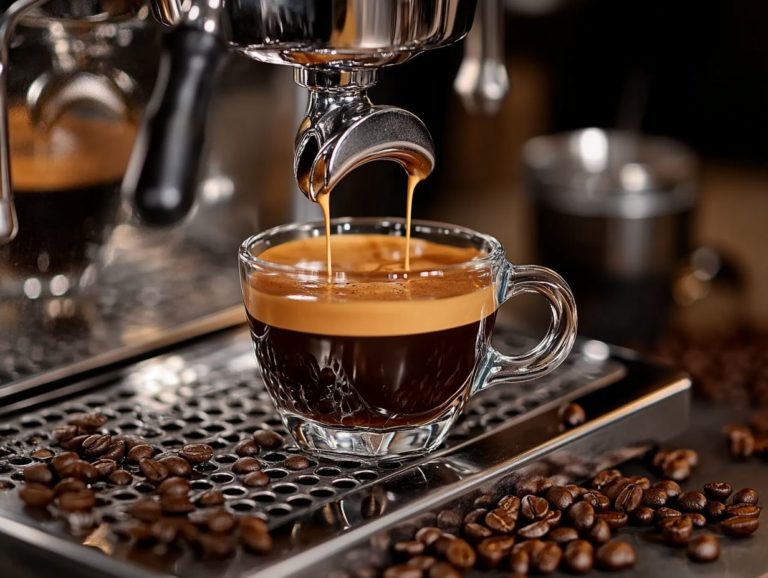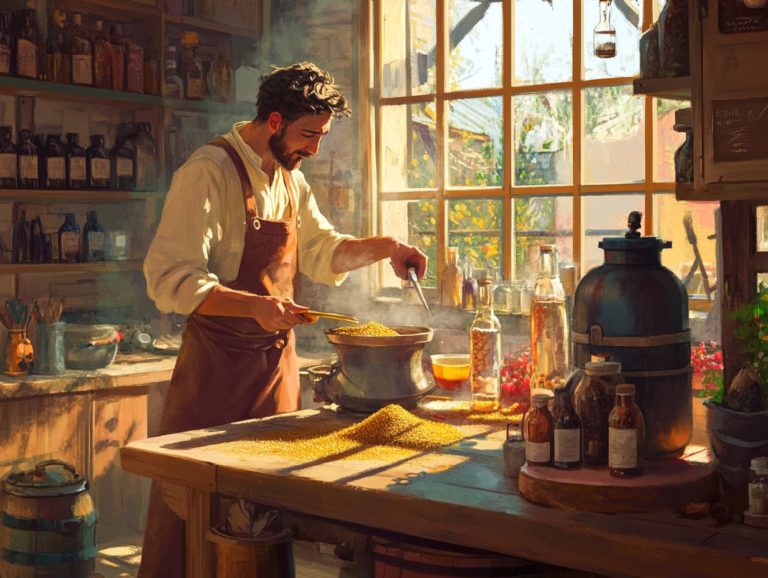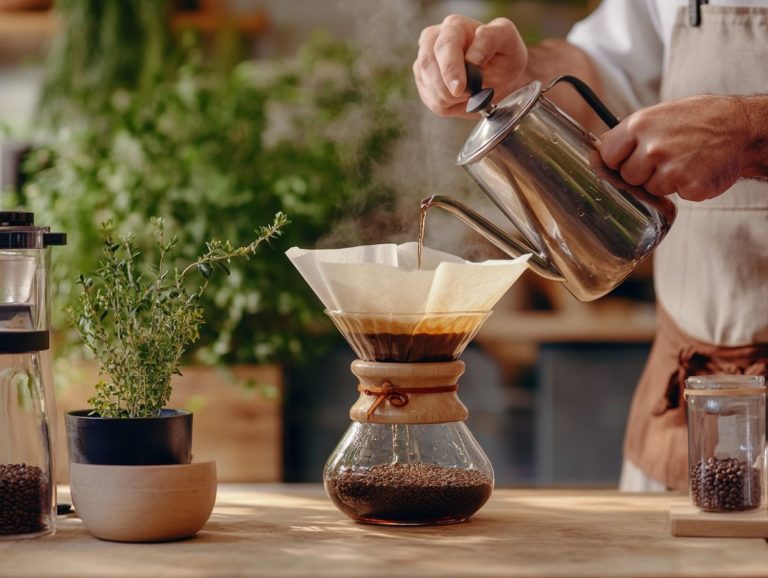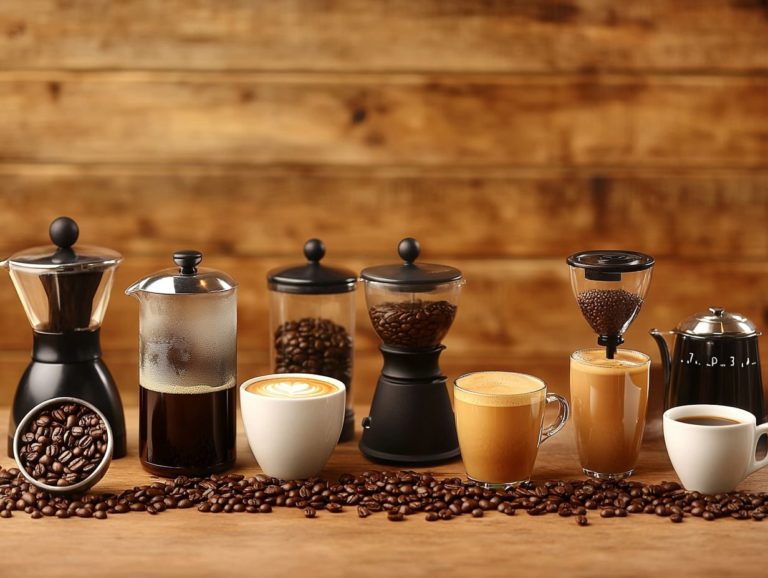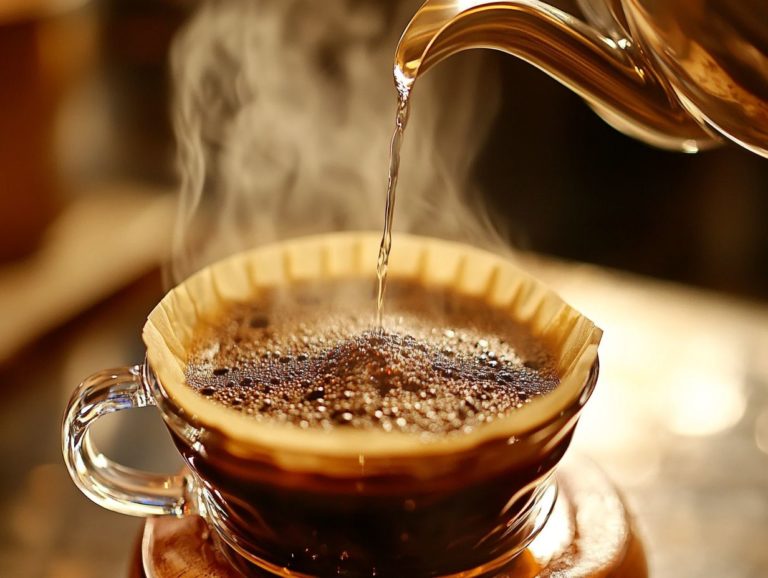Brewing Techniques to Reduce Bitterness
Contents
- Understanding Bitterness in Beer: Techniques to Reduce It
- Key Takeaways:
- What Causes Bitterness in Beer?
- What Are the Different Brewing Techniques to Reduce Bitterness?
- 3. Adjusting the Wort pH
- 4. Using Specialty Malts
- 5. Adding Adjuncts
- 6. Boiling for a Longer or Shorter Time
- Best Practices for Minimizing Bitterness in Beer
- What Are the Potential Side Effects of Reducing Bitterness in Beer?
- Understanding Bitterness in Beverages
- Frequently Asked Questions
- What are some brewing techniques and coffee tips to reduce bitterness?
- How does adjusting the mash pH or coffee ratio affect bitterness?
- What role do specialty malts and coffee adjustments play in reducing bitterness?
- How can controlling the brewing process decrease bitterness?
- Are there any specific hop varieties or coffee beans that can help reduce bitterness in beer and coffee?
- What is dry hopping and how does it affect bitterness in beer?
Understanding Bitterness in Beer: Techniques to Reduce It
Bitterness in beer is a defining characteristic, yet it’s not an intensity that everyone appreciates. Understanding what drives this bitterness is crucial for you as a brewer if you aim to strike the perfect balance in your creations.
From the timing of hop additions to experimenting with specialty malts, various brewing techniques can greatly influence your flavor profile. In this article, you ll find effective methods for reducing bitterness, best practices for achieving a harmonious brew, and potential side effects of dialing down those bitter flavors.
Whether you re a seasoned brewer or just embarking on your brewing journey, you ll discover how to craft the ideal beer that truly delights your palate.
Key Takeaways:
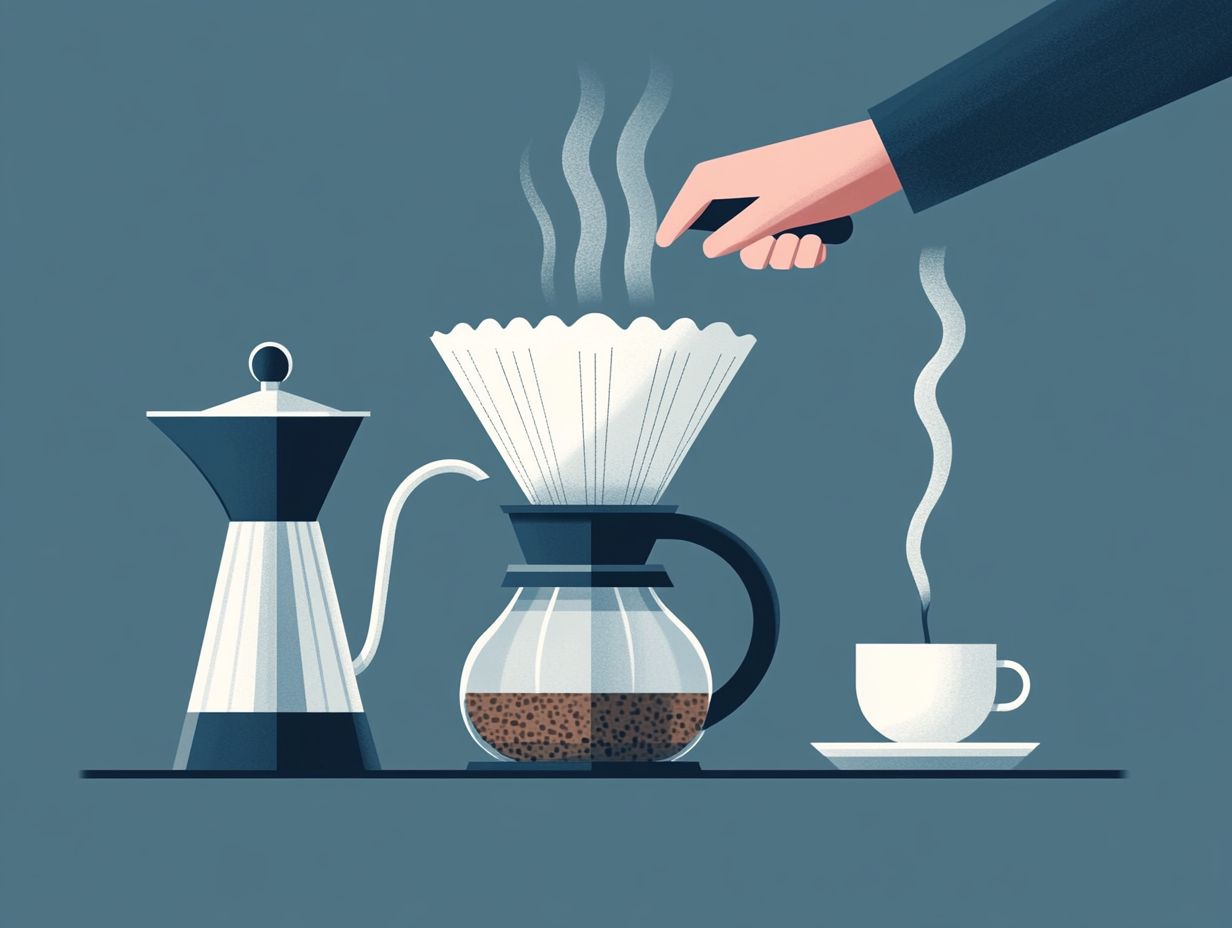
- Experiment with different hop addition times to reduce bitterness in beer.
- You can also minimize bitterness by using low alpha acid hops or specialty malts for a less bitter brew.
- Be vigilant during the boil and adjust the wort’s pH for the desired level of bitterness.
What Causes Bitterness in Beer?
Bitterness in beer is a fascinating interplay of various factors, including the type and timing of hop additions, the quality of water, and the specific brewing techniques employed throughout the extraction process.
Much like a coffee enthusiast who strives to avoid the pitfalls of over-extraction, you, as a brewer, must carefully balance these elements to achieve a level of bitterness that harmonizes with the overall flavor profile akin to finding that sweet spot in brewing specialty coffee.
Grasping these influences is essential for elevating your enjoyment of both beer and coffee to new heights.
What Are the Different Brewing Techniques to Reduce Bitterness?
To minimize bitterness in your beer, you can employ a range of sophisticated brewing techniques that focus on optimizing coffee extraction processes, utilizing high-quality water, and fine-tuning hop timing and varieties.
These methods mirror the practices of coffee enthusiasts who strive to elevate their brewing experiences, ensuring a harmonious coffee profile devoid of any unpleasant bitter flavors.
1. Changing the Hop Addition Time
Altering the hop addition time in your brewing process can profoundly affect the bitterness of your beer, allowing you to refine your recipes for more appealing flavor profiles. This is similar to how coffee enthusiasts adjust brew times to enhance the delightful bitterness of their favorite cup.
By thoughtfully selecting when to add hops during the boiling phase, you can manipulate the release of alpha acids compounds in hops that contribute to bitterness. A late addition invites more hop aroma and flavor into the mix, while an early addition amplifies the bitter taste.
In a similar vein, coffee aficionados experiment with steeping times, varying the duration to control how extraction influences the overall bitterness of their brew. Just as a shorter brew time might yield a smoother cup, adjusting your hop timing can transform your beer from overly bitter to a harmonious blend bursting with hop character and balance.
2. Using Low Alpha Acid Hops
Utilizing low alpha acid hops is a clever strategy for brewers looking to minimize bitterness in their creations. These hops provide delightful flavors without overwhelming bitter notes, much like how a coffee aficionado carefully selects specific beans to avoid that unpleasantly bitter coffee experience.
By focusing on lower alpha acid varieties, you can achieve a harmonious balance in your beers, allowing the more subtle flavors to truly shine while keeping the drinkability factor intact. It s akin to selecting coffee beans that deliver rich, aromatic notes without the harshness typically associated with higher-acidity options.
The choice of hops plays a crucial role in shaping the final taste, making it essential to select varieties that complement the other ingredients. Think of it as choosing the right coffee selection that elevates the entire brew.
In the end, low alpha acid hops can add complexity and depth to your beer, creating a delightful experience for those who savor nuanced flavors over intense bitterness.
Now that you are equipped with these techniques, why not try them in your next brewing adventure?
3. Adjusting the Wort pH
Adjusting the wort pH the acidity level of the liquid extracted from malted grains before fermentation is a vital step in your brewing process. It significantly influences the perceived bitterness of your beer. Think of it like how the quality of water impacts flavor extraction in coffee, determining whether you enjoy a well-balanced cup or face overwhelming bitterness.
Both brewing methods underscore the necessity for precision. In beer, lowering the pH enhances hop solubility, amplifying perceived bitterness. Meanwhile, maintaining an optimal pH encourages the development of complex malt flavors. Similarly, when brewing coffee using methods like pour-over or espresso, the mineral content and pH of your water play a crucial role in how flavors emerge in each cup. If the water is too hard or imbalanced, it can mask the subtle notes that true coffee aficionados cherish.
Ultimately, by mastering and controlling these variables, you can craft beverages that achieve a harmonious balance between bitterness and flavor. This significantly elevates the overall tasting experience.
4. Using Specialty Malts
Incorporating specialty malts into your brewing process can elevate your beer to new heights. It creates a more balanced flavor profile that minimizes unwanted bitterness. This concept is similar to how coffee experts select specific roast levels and beans to coax out optimal sweetness in their brews.
By meticulously choosing these malts, you have the power to enhance the complexity of flavors. Much like a skilled barista curates a blend of beans to reveal the richness and depth in each cup, your choices can significantly impact your beer’s taste. Just as certain coffee roasts can introduce luscious caramel, nutty, or fruity notes that enhance the overall profile, specialty malts can contribute layers of sweetness, chocolate, or toasty characteristics to your beer.
This approach highlights the importance of brewing techniques. Whether you re working with beer or coffee, both require precision in temperature and timing to extract the best flavors. Your goal is to achieve a harmonious balance where every element works in concert, crafting an enriching experience for the palate.
5. Adding Adjuncts
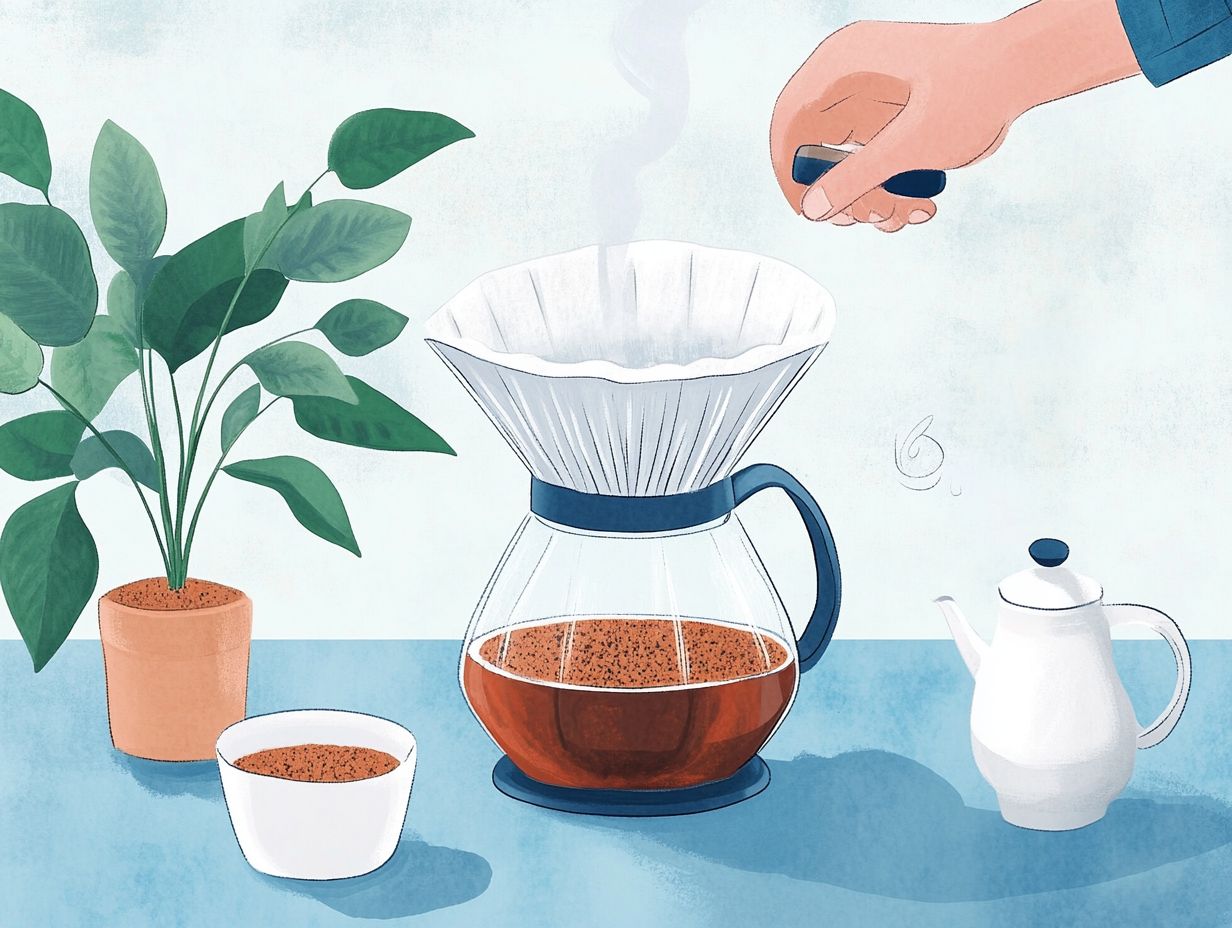
When you add adjuncts in brewing, you’re about to embark on an exciting journey of flavors. These additions can soften bitterness and elevate your overall tasting experience similar to how coffee aficionados enhance their brews with flavor boosters to enrich complexity and tone down sharpness.
You have a range of adjuncts at your disposal, like spices, fruits, and grains, each bringing its unique character to the final beverage. For example, incorporating coriander or orange peel can infuse a delightful citrusy brightness. Meanwhile, grains like oats can create a luscious, creamy mouthfeel.
In the realm of coffee, additives such as vanilla beans or caramel syrups not only enhance sweetness but also round out the flavor profile beautifully. Just as brewers meticulously choose their adjuncts for a harmonious taste, you too recognize how your choice of brewing method be it cold brew or espresso plays a crucial role in revealing the complex flavors hidden within your coffee beans.
6. Boiling for a Longer or Shorter Time
The duration of boiling in the brewing process is crucial. Longer boiling times can ramp up the bitterness, while shorter ones can help maintain a more approachable flavor profile. This resembles how slight adjustments in brewing time can lead to different taste experiences for coffee enthusiasts.
Just as with a French press or a shot of espresso, where steeping time plays a pivotal role, the duration of boiling can drastically change your brewing adventure. When brewing coffee, a slight increase in extraction time might yield a cup with more pronounced bitter notes, adding layers of flavor complexity.
Conversely, opting for shorter brewing methods allows you to savor a smoother, more balanced profile that showcases the coffee’s natural sweetness. In the same vein, when boiling specific ingredients, being mindful of time can be the difference between a delightful sip and an overwhelming harshness.
It all underscores the delicate interplay between time, temperature, and flavor that can elevate your brewing experience.
7. Dry Hopping
Dry hopping is a technique you ll want to master. It enhances aroma without significantly ramping up bitterness. This approach allows you to create complex flavor profiles, much like a coffee lover who experiments with different brewing methods to highlight specific flavors while keeping those bitter notes at bay.
In essence, you re adding hops after the boiling process. This lets those volatile aromatic compounds infuse your beverage without the harsh bitterness that tends to come from prolonged boiling. By keeping the temperatures lower during this stage, you can craft a fragrant and flavorful experience that beautifully complements the natural sweetness and acidity of the ingredients.
Think of it like when you, as a coffee lover, explore various brewing methods such as pour-over, French press, or cold brew. You are looking to bring out unique flavors by using quality water and fresh coffee grounds, creating a delightful symphony of flavors that dances on the taste buds while steering clear of that unwelcome bitterness that can overwhelm your experience.
The art of dry hopping mirrors this craft. It showcases the delicate balance between aroma and flavor that both brewers and coffee lovers strive to achieve.
Best Practices for Minimizing Bitterness in Beer
Implementing best practices in brewing is crucial for minimizing bitterness in beer. This involves thoughtfully selecting high-quality ingredients and adopting effective brewing techniques. You might even find parallels in how coffee lovers make adjustments to craft a balanced coffee that avoids overpowering bitter flavors.
By embracing these principles, you can create a more refined and enjoyable drinking experience, similar to the enjoyment experienced by coffee lovers.
1. Start with a Solid Recipe
A solid recipe is your foundation for successful brewing. It minimizes bitter flavors and ensures a harmonious balance. Think of it as the key to unlocking the full potential of your coffee, allowing you to enjoy a well-crafted brew that enhances flavor while keeping bitterness at bay.
When you re crafting an exceptional brew, understanding the ratios of your ingredients is essential. Each component uniquely influences the final profile. Factors like water quality, coffee type, and roast level significantly impact acidity and body, shaping your drink’s character.
Choosing the right brewing method whether it s pour-over, French press, or espresso can dramatically alter your perception of bitterness and sweetness. For example, a coarser grind paired with a longer steeping time may lead to a more balanced flavor. Careful attention to extraction times can help you dodge those pesky bitter notes. These techniques are essential in both coffee brewing and beer making.
In doing so, you create a captivating and enjoyable drinking experience that keeps you coming back for more.
2. Use Quality Ingredients
Utilizing high-quality ingredients is essential in your brewing endeavors if you want to achieve a refined flavor profile while keeping bitterness at bay. This principle mirrors the dedication coffee lovers have for using specialty coffee beans and fresh grounds.
In both cases, your choice of raw materials can significantly impact the final product. Whether you re brewing tea or specialty beers, the quality of your water, grains, and other ingredients plays a direct role in shaping the taste and aroma. Using quality water and fresh coffee grounds can significantly enhance coffee flavors.
Just as coffee lovers appreciate the importance of sourcing the finest Arabica beans or achieving the perfect grind size, you too must be discerning when selecting components like malt and hops. Pay attention to ingredient quality to elevate your brew to new heights! By doing so, you ensure that your brewing techniques yield beverages that are not only flavorful but also harmoniously balanced, delighting your palate with every sip.
In conclusion, reducing bitterness in both beer and coffee is essential for crafting enjoyable beverages. By mastering techniques like dry hopping and selecting quality ingredients, you can create drinks that highlight the best flavors while minimizing undesirable bitterness.
3. Monitor Your Boil Vigilantly
Vigilantly monitoring your boil is essential when brewing. It helps prevent excessive bitterness from creeping in, much like how precise timing in coffee brewing can elevate or detract from the final taste. This attention to detail is crucial in both beer brewing and coffee extraction.
In the context of beer brewing, the boil stage is critical for extracting vital flavors from the hops. If this stage is rushed or mishandled, you risk creating a beer that can taste too bitter. Similarly, in coffee preparation, the brewing time directly impacts the extraction process of soluble compounds, determining whether your cup is beautifully balanced or marred by a harsh taste. Over-extracted coffee, for example, can result in an overly bitter taste that diminishes the overall coffee experience.
Both crafting techniques demand careful timing to preserve the delicate balance of flavors. This allows drinkers to fully savor the nuanced profiles of their beverages.
4. Experiment with Different Techniques
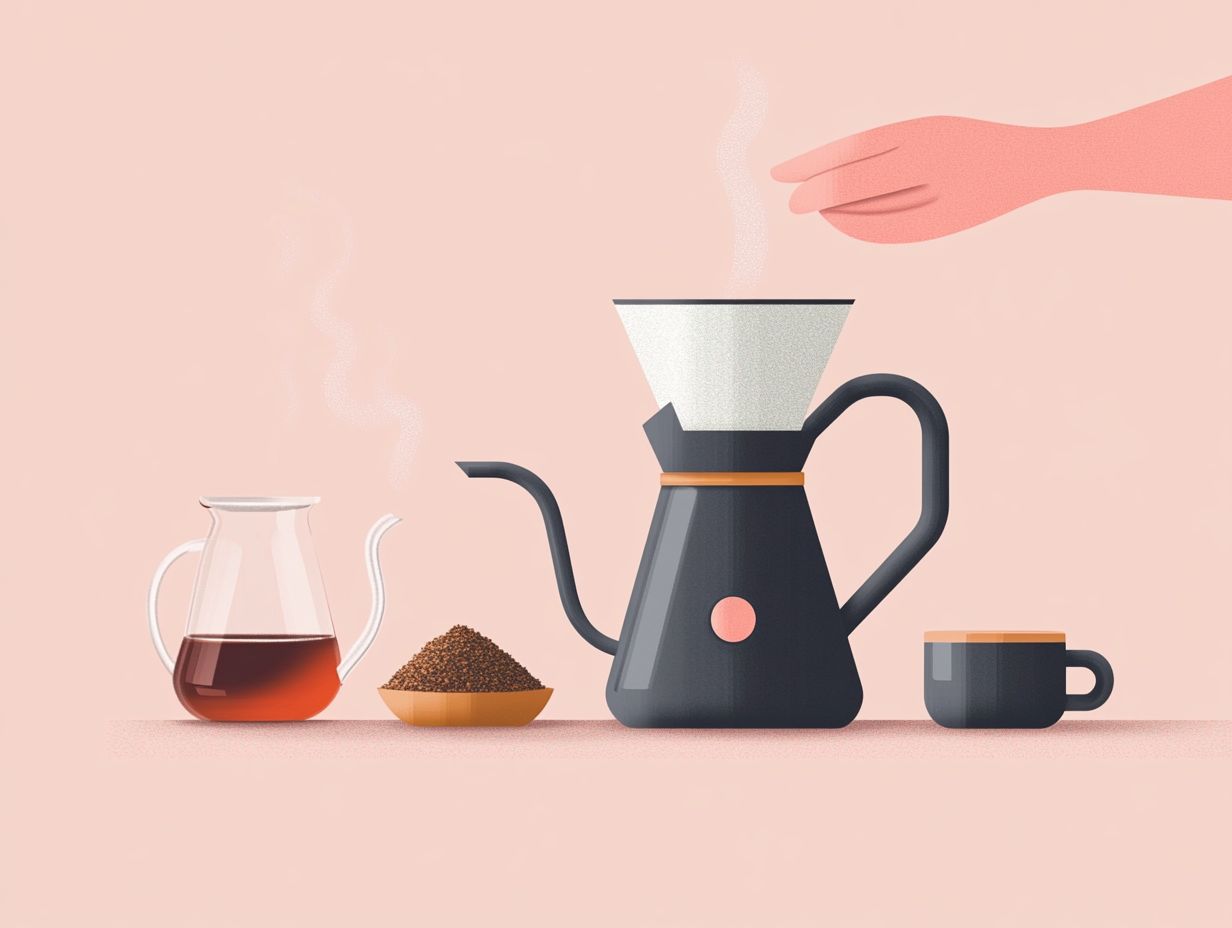
Experimenting with various brewing techniques is crucial for you to discover that perfect balance in beer flavor. Much like how coffee drinkers tinker with grind sizes and brew times to achieve their ideal cup, you can adjust variables to refine your brews.
Coffee tips from seasoned baristas often emphasize finding that sweet spot in grind size and brew time to achieve a balanced coffee with delightful bitterness. By exploring essential factors such as water temperature, steeping duration, and the specific hops or malts you choose, you can elevate your creations to new heights.
Consider how techniques like cold brew versus French press can dramatically alter the final flavor profile of coffee. Similar variations in fermentation times or yeast strains (the specific types of yeast used in fermentation) can significantly impact the complexity of your beer. Using fresh coffee and paying attention to coffee ratios can enhance flavor development.
Encouraging this kind of experimentation not only expands your understanding of flavor development but also leads to delightful surprises that can transform an ordinary beverage into an extraordinary experience!
5. Seek Feedback and Adjust Accordingly
Seek feedback and adjust your brewing process for better results! Making thoughtful adjustments is crucial for refining beer quality, much like how coffee enthusiasts solicit opinions to elevate their brewing methods and enhance their coffee experiences.
Establishing feedback loops is essential for crafting a drink that meets the highest standards of taste and aroma. Gathering insights from tasters can reveal flavor profiles that may need fine-tuning, whether it s tweaking fermentation temperatures or modifying hop additions.
These interactions not only lead to richer flavors but also foster a vibrant community of passionate brewers and drinkers who are eager to share their experiences. By actively engaging in this iterative process, you can tailor your recipes with techniques like dry hopping (adding hops after fermentation for aroma) or adjusting grain selections, ultimately creating a brew that resonates more deeply with your audience.
What Are the Potential Side Effects of Reducing Bitterness in Beer?
Reducing bitterness in beer can certainly enhance its palatability. However, it’s essential to be aware that this can also introduce potential side effects that impact the overall flavor balance.
Much like the adjustments made in coffee brewing, which can inadvertently diminish certain flavor compounds, altering the bitterness in beer could affect the overall enjoyment for the drinker.
Understanding Bitterness in Beverages
1. Loss of Balance
One significant side effect you may encounter when lowering bitterness is the potential loss of balance in your beverage, which can lead to uncharacteristic flavor profiles.
It s akin to how excessively lowering acidity in coffee can result in flat or bland experiences for true coffee connoisseurs. This balance is crucial for ensuring that your drink delivers a harmonious mix of flavors, allowing the sweetness from malts and the aromatic qualities to truly shine.
In beer, diminished bitterness can distort the intended profile, making the drink overly sweet or even dull. Similarly, in coffee brewing, adjusting variables like brew time and temperature to decrease acidity might strip away its vibrancy. Over-extracted coffee, for example, can result in an overly bitter taste that diminishes the overall coffee experience.
As an enthusiast, you recognize that achieving just the right amount of counterbalance is essential for highlighting the complex notes whether they are fruit-forward or earthy in both beverages. Crafting the perfect drink is an exciting journey that every enthusiast will love!
Coffee roasting, for example, can bring out chocolate or citrus notes that enhance the overall flavor profile.
2. Decreased Shelf Life
Diminishing bitterness in beer might inadvertently affect its shelf life, since bitterness can actually help preserve freshness much like how certain adjustments in coffee can influence the longevity of its flavor.
For instance, the chemical process during roasting that affects flavor and aroma impacts both the aroma and shelf life of the coffee beans. Both beer and coffee depend on specific brewing techniques to uphold their quality over time.
In the realm of beer, the careful selection of hops and the timing of their addition during the brewing process can enhance bitterness while also contributing to overall stability.
In coffee, factors like grind size and extraction time play crucial roles in determining both taste and durability. You ll find that brewers and coffee makers alike must strike an optimal balance to create the best experience.
Take cold brewing, for example. This method can reduce bitterness in coffee, but it may also change how long the flavor endures, ultimately affecting the overall drinking experience.
The relationship between bitterness and shelf life is a complex one, demanding a keen mastery of brewing methods to craft a product that remains delightful for an extended period.
Furthermore, coffee lovers are often aware of how adjustments in brewing techniques can influence both the immediate taste and long-term quality of their coffee.
3. Less Intense Aroma
A reduction in bitterness can sometimes lead to a more subtle aroma, as certain aromatic compounds are often intertwined with the bitterness level in beer, much like how the aroma of coffee can transform based on brewing methods and the flavor compounds inherent in the coffee beans.
For instance, the sweet spot in coffee extraction can bring out delicate aromatic qualities. In both brewing and coffee preparation, the extraction process plays a crucial role in achieving a harmonious balance of flavors.
Brewing methods such as cold brew frequently result in a smoother, less bitter profile, which can enhance the natural sweetness and aromatic qualities of the coffee.
In a similar vein, when it comes to beer, selecting specific hops or adjusting the boiling duration can produce a more pronounced fragrance, even if the bitterness is dialed back.
Coffee extraction is key to bringing out unique flavors and aromas from coffee beans sourced from regions like Sumatra, Papua New Guinea, Vietnam, Colombia, Ethiopia, and Costa Rica.
This interaction illustrates that while bitterness may obscure certain aromas, refining the brewing process can uncover complex flavor profiles, inviting coffee enthusiasts and connoisseurs to fully appreciate the layered characters present in both beverages.
4. Potential for Infection
Reducing bitterness through various brewing adjustments might seem like a smart move. However, it can unintentionally create the perfect environment for infection. This underscores the necessity of using top-notch ingredients and maintaining impeccable sanitary practices.
Just think about how coffee brewers ensure their equipment, coffee beans, and grind size are spotless to maintain the integrity of the coffee experience and flavor. If you neglect these critical standards during the brewing process, you risk introducing bad flavors that can completely derail the intended profile of your beverage.
In both beer and coffee production, failing to properly store and handle your ingredients, including water quality and fresh coffee grounds, can invite unwanted microorganisms, ultimately risking the taste you aim for.
To achieve the finest results, you should always keep a close eye on your brewing steps, clean your equipment regularly, and select only high-quality inputs, such as specialty coffee and quality water. Paying close attention to these details not only prevents potential infections but also enhances the overall character and enjoyment of your final product, transforming the brewing process into a true craft.
Frequently Asked Questions
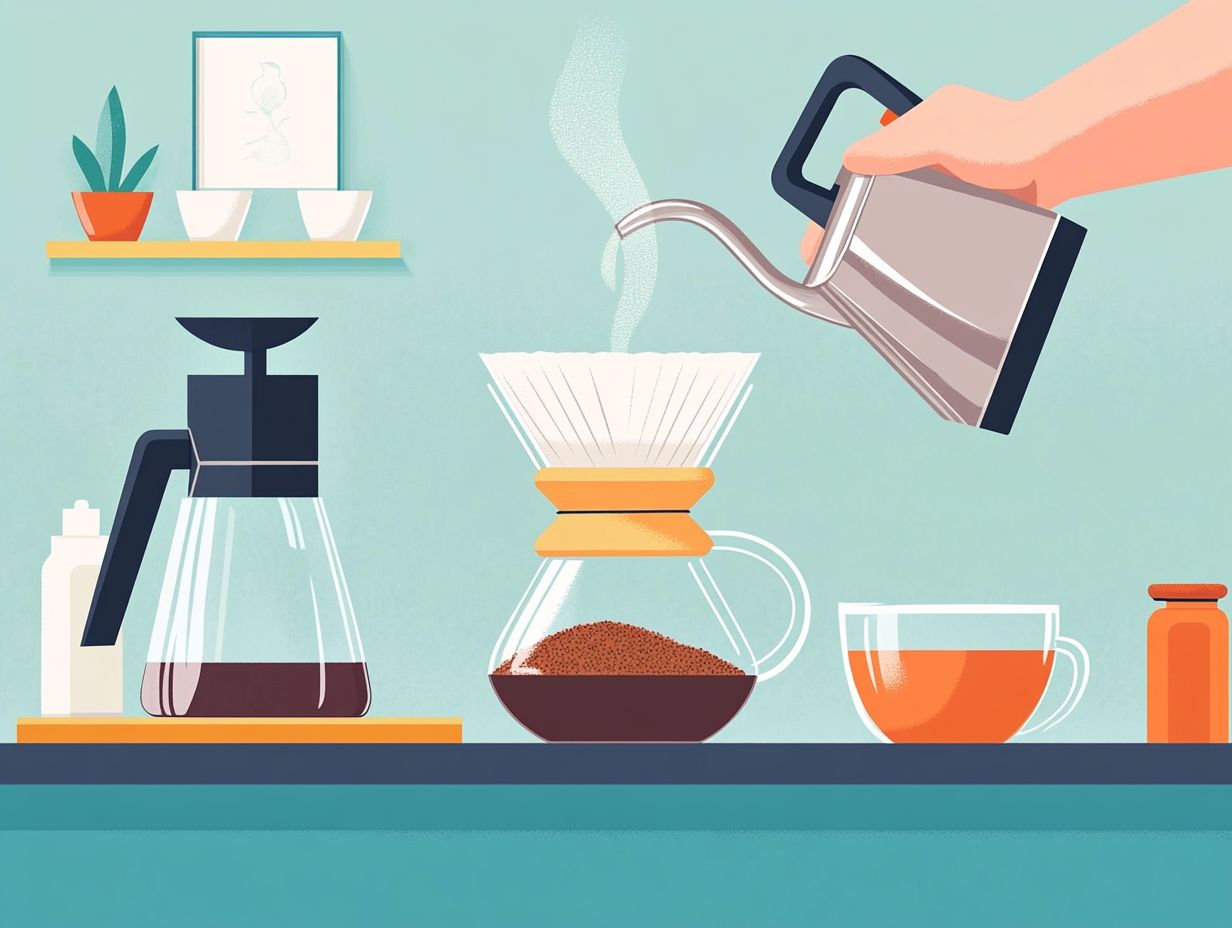
What are some brewing techniques and coffee tips to reduce bitterness?
Some brewing techniques and coffee tips to reduce bitterness include adjusting the mash pH, using specialty malts, and controlling the boiling process. For coffee, methods such as coarser grind size and shorter brew time can help achieve a balanced coffee.
How does adjusting the mash pH or coffee ratio affect bitterness?
Adjusting the mash pH can help reduce bitterness by allowing the enzymes in the mash to work more efficiently, resulting in a smoother and less bitter beer. Similarly, adjusting the coffee ratio can lead to a more balanced coffee with less bitter taste.
What role do specialty malts and coffee adjustments play in reducing bitterness?
Specialty malts, such as caramel and chocolate malts, can add sweetness and complexity to the beer, balancing out the bitterness from hops. In coffee, adjustments like water temperature and grind size can help achieve the sweet spot, reducing bitter notes.
How can controlling the brewing process decrease bitterness?
Controlling the length and intensity of the boil can help reduce bitterness by preventing the extraction of certain hop compounds that contribute to bitterness. Similarly, controlling water temperature and brew time in coffee brewing methods can help avoid over-extracted coffee, reducing bitter flavors.
Are there any specific hop varieties or coffee beans that can help reduce bitterness in beer and coffee?
Yes, hop varieties such as Saaz, Fuggle, and Hallertau have lower levels of alpha acids, which contribute to bitterness, making them good choices for reducing bitterness in beer. For coffee, choosing high-quality Arabica coffee over low-grade beans can enhance flavor profiles and reduce bitter taste.
What is dry hopping and how does it affect bitterness in beer?
Dry hopping is the process of adding hops to beer after the boil, which results in less bitterness and more hop aroma and flavor. This technique can be used to reduce perceived bitterness in beer. In coffee brewing, methods like cold brew, French press, and pour over can also influence coffee flavors and reduce bitterness.
